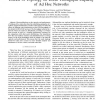Free Online Productivity Tools
i2Speak
i2Symbol
i2OCR
iTex2Img
iWeb2Print
iWeb2Shot
i2Type
iPdf2Split
iPdf2Merge
i2Bopomofo
i2Arabic
i2Style
i2Image
i2PDF
iLatex2Rtf
Sci2ools
116
click to vote
PIMRC
2008
IEEE
2008
IEEE
Effects of topology on local throughput-capacity of ad hoc networks
—Most publications on the capacity and performance of wireless ad hoc networks share the underlying assumption of a uniform random distribution of nodes. In this paper, we study the effects of different node distributions on the local throughput of the slotted ALOHA MAC protocol. The throughput achieved in a network where the nodes are distributed according to a Poisson point process is used as a baseline performance measure for the comparison with other point distributions. Our simulations show that non–uniform random node distributions have a strong impact on the local throughput which is related to the network capacity and performance. This means that the node topology should be taken into account in more detailed analyses and simulations of ad hoc, sensor, and mesh networks.
Related Content
| Added | 01 Jun 2010 |
| Updated | 01 Jun 2010 |
| Type | Conference |
| Year | 2008 |
| Where | PIMRC |
| Authors | Jakob Hoydis, Marina Petrova, Petri Mähönen |
Comments (0)

